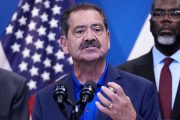
Virginia is set to be the site of major inter- and intra-party warfare in 2023 as the state braces for its off-year elections, which will determine whether Republican Governor Glenn Youngkin is able to get a GOP-dominated state legislature stacked with loyalists, who would give him the clout with which to position himself as a viable presidential contender in 2024 or down the line.
While Youngkin has previously said he will not be seeking the presidency in the current cycle, his aides have smoothed over those remarks to leave open the door for a potential candidacy. But even if he ultimately rules out 2024, it’s likely that Youngkin sees a possible path for himself in 2028 — but that would entail establishing himself much more strongly as a conservative leader on the national stage in the way Governor Ron DeSantis of Florida has.
DeSantis, of course, has the advantage of working with Republican supermajorities in both houses of the Florida legislature, while in Virginia, Democrats still control the Senate — a condition that has frustrated Youngkin’s legislative agenda.
Thus, the 2023 election in Virginia is now seen as an important opportunity for both parties. Democrats hope to retake the House and bolster their Senate majority in order to turn back the tide on conservatism that Youngkin spearheaded when elected in 2022.
Republicans, meanwhile, aim to flip the Senate. And Youngkin not only wants to ensure the GOP takes control of the upper chamber, he wants to ensure lawmakers elected to both houses of the legislature fall in line with his vision. As a result, he is wading into several primary races with endorsements and support from his Spirit of Virginia PAC, which has raised millions of dollars.
The chair of that PAC, Dave Rexrode, told Politico that the governor’s focus is on his own state, not on White House ambitions.
“The governor is solely focused and committed on what we have to do over the next 144 days,” Rexrode said. “His whole focus, our organization’s whole focus, everything we’re doing is completely focused on maintaining our majority in the House and flipping the state Senate. And that’s enough to keep us busy.”
Politico further reported:
And for Republicans, the November elections are an opportunity to provide Youngkin a unified government to pass his agenda. The split legislature has been stuck in a long-running feud over the state budget and proposed tax cuts from Youngkin, among other sticking points.
“Having the House and Senate that [Youngkin’s] able to work together with to get some real meaningful reforms on would be good for the Commonwealth,” Rexrode said.
But first, both parties must navigate a tricky primary season on new maps. This is the first election since the pandemic-era census redrew maps in Virginia. Ultimately, the state Supreme Court stepped in and appointed special masters to draw the lines. Both parties believe they have viable paths to a majority in each chamber — but the court-drawn maps were made without regard to where incumbents lived, and this primary could remake state politics.
Clearly, the stakes are incredibly high, leading to heated contests within both of the major parties.
On the Democratic side, for instance, former Delegate Lashrecse Aird is challenging fellow Senator Joe Morrissey for his seat. She is placing heavy focus on her support of abortion as well as on Morossey’s reputation for scandal, which includes allegations of spousal abuse and a conviction of contributing to the delinquency of a minor.
Indeed, the abortion fight will prove both a key factor and consequence of the 2023 election. Youngkin has proposed a ban on abortion after 15 weeks, but the Democrat-dominated Senate has held it back. If Republicans get their way, Virginia may follow other Southern states in enacting post-Roe restrictions on abortion.
Susan Swecker, the chair of the state Democratic Party, told Politico: “The threat to Virginians is if Glenn Youngkin wins two chambers and has a trifecta. It’s only thanks to Virginia Democrats that we are the only state in the south without an abortion ban.”
Also in the Democrat primary, former Delegates Jennifer Carroll Foy and Hala Ayala are squaring off for an open Senate seat.
On the Republican side, Senator Amanda Chase, a Trump supporter who in 2021 was censured by her colleagues for referring to January 6 defendants as “patriots,” faces two primary challengers. Foy came in second place behind Terry McAuliffe in the Democratic primary for governor in the 2021 election, while Ayala was McAuliffe’s running mate.
Youngkin is backing state Delgate Tara Durant over businessman Matt Strickland, who made a name for himself opposing government COVID restrictions, for a Senate seat.
As with other races on which Youngkin is placing his thumb, the result of the race will show to what degree the governor has a hold over the state party — and, by extension, state politics.





